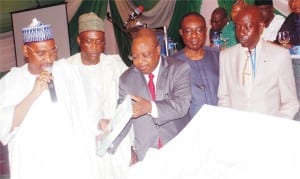Business
Deregulation, Best Option For Nigeria’s Economic Dev
The Major Oil Marketers Association of Nigeria (MOMAN) has said that deregulation of the downstream sector of the oil and gas industry remains the best option to move the economy forward.
The Executive Secretary of MOMAN, MrObafemiOlawore, made the assertion in an interview with newsmen in Lagos on Monday.
Olawore said that deregulation would bring in investments into the sector, adding that only deregulation would encourage the establishment of private refineries in the country.
According to him, the Federal Government should summon the courage to fully deregulate and remove subsidy or embark on continuous subsidy regime payment as at when due.
“If government likes, they can introduce gradual removal of subsidy but it should not go beyond 6 to 18 months period.
“If fully deregulated with rules, you will have the serious investors coming in to invest adequately,” Olawore said.
According to him, deregulation is the answer and the government must talk to the people and let them understand the advantages.
“The governemnt must also show that in the areas where there have deregulation, people are gaining and that whatever comes in as funds will be used for the benefit of the people.
“People should know that the subsidy refund is not dash money. It is what you have paid for and somebody is paying you back because you have been told to sell below the market price.
“We were hoping that we will be paid back on time but the refund is delayed infinitely. Banks are on us demanding for their money and interest,” he said.
The executive secretary also said that the foreign exchange element affected the business.
“When you buy a product at 160 to 1 dollar, for instance, and you don’t get the money until the exchange rate has been raised to 240, it means that you incur a huge loss. Who bears that?
He said that there was need for government to pay as at when due for marketers to underscore the need for a hedge fund that would enable importers to cover such losses.
“There is no hedge fund that will give us protection for one year because increases come up, so many feel that once there is a hiccup it will lead to increase in price,’’ he said.
Olawore said that passage of the Petroleum Industry Bill (PIB) remained the best options that would usher in deregulation, adding that even if the current PIB was not perfect, it could be amended after the passage.
“Once you deregulate, these refineries will be coming up. So, we will plead that we get the National Assembly to pass the PIB.
“We believe that the PIB will go a long way in encouraging deregulation but if we want a PIB that will be faultless before it will be passed, then we are thinking that we are not human beings.
“ Why do we have the word amendment? How many amendments have they done on the American constitution?
“American constitution has experienced so many amendments. It is better to pass it and as we go ahead, if there is any need for amendment, we make it,” he said.

L-R: Accountant-General of the Federation, Mr Jonah Otunla; Representative of the Vice President, Amb. Bashir Yuguda; Head of the Civil Service of the Federation, Mr Danladi Kifasi; Permanent Secretary, Ministry of Land and Urban Development, Mr George Ossi and Auditor-General of the Federation, Mr Samuel Ukura, during the Launch of Accrual Accounting Manual, International Public Sector Accounting Standards Compliant In Nigeria (IPSAS) in Abuja on Monday.
Business
Fidelity Bank To Empower Women With Sustainable Entrepreneurship Skills, HAP2.0
Business
President Tinubu Approves Extension Ban On Raw Shea Nut Export
Business
Crisis Response: EU-project Delivers New Vet. Clinic To Katsina Govt.
-

 News2 days ago
News2 days agoAmend Constitution To Accommodate State Police, Tinubu Tells Senators
-

 Politics2 days ago
Politics2 days agoSenate Urges Tinubu To Sack CAC Boss
-

 News2 days ago
News2 days agoDisu Takes Over As New IGP …Declares Total War On Corruption, Impunity
-
Business2 days ago
President Tinubu Extends Raw Shea Nuts Export Ban To 2027
-
Business2 days ago
Crisis Response: EU-project Delivers New Vet. Clinic To Katsina Govt.
-
Business2 days ago
President Tinubu Approves Extension Ban On Raw Shea Nut Export
-
Rivers2 days ago
Etche Clan Urges Govt On Chieftaincy Recognition
-
Business2 days ago
Fidelity Bank To Empower Women With Sustainable Entrepreneurship Skills, HAP2.0

